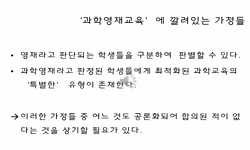The purpose of this study was to investigate the predictive validity of behaviroal characteristics checklists that are widely used in Korea for identifying mathematically gifted students. Three most widely used checklists were selected and implemented...
http://chineseinput.net/에서 pinyin(병음)방식으로 중국어를 변환할 수 있습니다.
변환된 중국어를 복사하여 사용하시면 됩니다.
- 中文 을 입력하시려면 zhongwen을 입력하시고 space를누르시면됩니다.
- 北京 을 입력하시려면 beijing을 입력하시고 space를 누르시면 됩니다.

예측타당도를 중심으로 한 관찰·추천 영재판별용 행동특성 평정척도의 유용성 탐색 = Exploring the Predictive Validity of Behavioral Characteristics Checklists for Identifying Mathematically Gifted Students in Korea
한글로보기https://www.riss.kr/link?id=A99812957
- 저자
- 발행기관
- 학술지명
- 권호사항
-
발행연도
2013
-
작성언어
Korean
- 주제어
-
KDC
379
-
등재정보
KCI등재
-
자료형태
학술저널
- 발행기관 URL
-
수록면
835-855(21쪽)
-
KCI 피인용횟수
5
- 제공처
-
0
상세조회 -
0
다운로드
부가정보
다국어 초록 (Multilingual Abstract)
The purpose of this study was to investigate the predictive validity of behaviroal characteristics checklists that are widely used in Korea for identifying mathematically gifted students. Three most widely used checklists were selected and implemented to classroom teachers who could teach and observe gifted students in regular classes. The predictive validity of the tree checklists were explored by generating the correlations between their ratings using those three checklists and the performance levels of gifted students, which were measured by teachers in gifted classes. Findings of this study are the followings: First, all three checklists could statistically significantly predict the performance of gifted students in gifted programs, and the checklist B showed the highest predictability. Secondly, without the assistance by those checklists, teachers could not predict the performance level of gifted students. Lastly, teachers that were trained for educating gifted students could very effectively predict the performance of gifted students with the aid of those checklists while teachers without appropriate training could not at all even with the aid of those checklists.
국문 초록 (Abstract)
우리나라의 영재교육 대상자 선발방식은 기존의 지필검사 방식에서 현장 교사에 의한 관찰·추천제로 전환되고 있다. 교사들이 영재 판별에 있어 가질 수 있는 편견을 최소화하고, 타당한 ...
우리나라의 영재교육 대상자 선발방식은 기존의 지필검사 방식에서 현장 교사에 의한 관찰·추천제로 전환되고 있다. 교사들이 영재 판별에 있어 가질 수 있는 편견을 최소화하고, 타당한 판별을 하도록 돕기 위한 도구로서 영재 행동 평정 척도가 널리 사용된다. 본 연구는 이러한 평정 도구들을 실제 영재 판별과정에 투입하였을 때 그 결과가 영재 학생의 영재 프로그램에서의 수행 수준을 얼마나 잘 예측하여 주고 있는지를 확인하는 것을 주요한 목적으로 수행되었다.
본 연구의 결과를 통한 결론은 다음과 같다. 첫째, 본 연구가 선정한 세 가지 영재 행동 특성 평정 척도는 모두 영재학생들의 영재성 수준을 유의미하게 예측해내었다. 이들 중 B 척도의 예측력이 전반적으로 가장 우수하였다. 둘째, 담임교사들의 주관적인 영재성 평정은 영재학생들의 영재성 수준에 대해 거의 예측해 내지 못하였다. 따라서, 담임교사들에게 영재교육 대상자를 추천하도록 할 때에는 담임교사들의 주관적 판단에 맡기기보다는 영재 행동 특성 평정 척도와 같은 객관적 도구를 활용하도록 할 필요가 있다. 셋째, 영재교육 관련 교육·연수 경험이 있는 교사들은 영재 행동 특성 평정 척도를 통해 영재학생의 영재성 수준을 매우 훌륭하게 예측해 낸 반면, 해당 경험이 없는 교사들은 같은 척도를 활용하더라도 영재학생의 영재성 수준을 거의 예측해 내지 못하였다. 따라서, 아무리 훌륭하게 고안된 척도가 제공되더라도 해당 교사가 영재교육에 관해 적절히 훈련되어 있지 못하면 전혀 타당한 정보를 제공해 줄 수 없음을 알 수 있다. 이는 관찰·추천에 의한 영재 판별을 수행하기 위해서 일반 교사들의 영재교육에 대한 훈련이 반드시 이루어져야 한다는 것을 말해준다고 하겠다.
참고문헌 (Reference)
1 진현정, "한국어판 영재아 행동특성 평정척도(K-SRBCSS)의 개발과 타당화" 한국영재학회 20 (20): 621-647, 2010
2 이동혁, "한국어판 Gifted Rating Scale의 구인타당도" 한국영재학회 20 (20): 595-619, 2010
3 강신포, "초등학교 수학 영재 및 일반 아동의 정의적 특성 비교 연구" 대한수학교육학회 5 (5): 3-457, 2003
4 박춘성, "초등 영재선별을 위한 평정척도의 타당화 연구" 서울대학교 대학원 2006
5 송인섭, "유아용 영재판별도구의 개발 및 타당화 연구" 한국영재교육학회 5 (5): 63-78, 2006
6 윤여홍, "영재아 판별에서 한국판 영재아 행동특성 체크리스트의 유용성에 관한 연구" 8 (8): 1-30, 1998
7 이인호, "영재교육 대상자 선발에서 교사 추천의 효용성 분석" 한국영재학회 19 (19): 381-404, 2009
8 이미순, "영재교사 및 부모에 의한 과학영재 행동평정의 비교와 과학적 수행 예측력 고찰" 한국초등교육학회 24 (24): 211-233, 2011
9 배아완, "수학적 유망성 신장을 위한 프로그램의 효과성" 3 (3): 1-21, 2010
10 이미순, "수학영재의 수행능력에 대한 교사 및 부모 평정의 예측력" 한국영재학회 21 (21): 829-845, 2011
1 진현정, "한국어판 영재아 행동특성 평정척도(K-SRBCSS)의 개발과 타당화" 한국영재학회 20 (20): 621-647, 2010
2 이동혁, "한국어판 Gifted Rating Scale의 구인타당도" 한국영재학회 20 (20): 595-619, 2010
3 강신포, "초등학교 수학 영재 및 일반 아동의 정의적 특성 비교 연구" 대한수학교육학회 5 (5): 3-457, 2003
4 박춘성, "초등 영재선별을 위한 평정척도의 타당화 연구" 서울대학교 대학원 2006
5 송인섭, "유아용 영재판별도구의 개발 및 타당화 연구" 한국영재교육학회 5 (5): 63-78, 2006
6 윤여홍, "영재아 판별에서 한국판 영재아 행동특성 체크리스트의 유용성에 관한 연구" 8 (8): 1-30, 1998
7 이인호, "영재교육 대상자 선발에서 교사 추천의 효용성 분석" 한국영재학회 19 (19): 381-404, 2009
8 이미순, "영재교사 및 부모에 의한 과학영재 행동평정의 비교와 과학적 수행 예측력 고찰" 한국초등교육학회 24 (24): 211-233, 2011
9 배아완, "수학적 유망성 신장을 위한 프로그램의 효과성" 3 (3): 1-21, 2010
10 이미순, "수학영재의 수행능력에 대한 교사 및 부모 평정의 예측력" 한국영재학회 21 (21): 829-845, 2011
11 신희영, "수학영재교육에서의 관찰평가와 창의력평가" 대한수학교육학회 9 (9): 241-257, 2007
12 유연정, "수학영재 교육프로그램을 위한 학생 평가도구 개발" 건국대학교 교육대학원 2008
13 송상헌, "수학 영재아들을 위한 행동특성검사지의 개발과 활용에 관한 연구" 2 (2): 427-457, 2000
14 송상헌, "수학 영재성 측정과 판별에 관한 연구" 서울大學校 大學院 1998
15 황동주, "수학 영재를 위한 행동 특성 검사도구 개발" 한국학교수학회 9 (9): 405-424, 2006
16 김홍원, "수학 영재 판별 도구 개발 연구" 한국교육개발원 1996
17 최호성, "교사 관찰·추천제를 활용한 영재교육 대상자 선발방식에 대한 부산지역 초등학교 학부모의 인식과 태도" 한국영재학회 21 (21): 407-426, 2011
18 우미란, "관찰․추천 전형으로 선발된 학생들의 교사추천서와 프로그램 수행의 관련성 분석" 한국영재학회 22 (22): 173-196, 2012
19 류지영, "관찰·추천을 통한 영재판별에 대한 영재담당교사들의 인식과 태도" 한국교원교육학회 27 (27): 159-178, 2010
20 박민정, "과학 영재교육 대상자 선발방법으로써 교사 추천제 분석: 학생의 과학적 태도, 탐구력, 사고력, 문제 해결력, 창의성을 중심으로" 한국과학교육학회 28 (28): 111-119, 2008
21 방미선, "과학 영재 관찰․추천 선발 방식에 대한 교사의 인식 조사 및 개선 방안" 한국초등과학교육학회 32 (32): 169-184, 2013
22 Fox, L. H., "and program planning: Models and methods, In Intellectual talent: Research and development" Johns Hopkins University Press 32-54, 1976
23 Coleman, M. R., "Updated Report on State Polices Related to the Identification of Gifted Students" University of North Carolina at Chapel Hill 1994
24 Martinson, R. A., "The identification of the gifted and talented: An instructional syllabus for the National Summer Leadership Training Institute on the education of the gifted and the talented" Office of the Ventura County Superintendent of Schools 1974
25 Balka, D. S., "The development of an instrument to measure creative ability in mathematics" University of Missouri 1974
26 Renzulli, J. S., "Scales for rating the behavioral characteristics of superior students: Technical and administration manual" Creative Learning Press 2002
27 Renzulli, J. S., "Scales for rating the behavioral characteristics of superior students" Creative Learning Press, Inc 1976
28 Benbow, C. P., "SMPY's model for teaching mathematically precocious students, In Systems and Models for Developing Programs for the Gifted and Talented" Creative Learning Press 1-26, 1986
29 Shore, B. M., "Recommended practices in gifted education: A critical analysis" Teachers College, Columbia University 1991
30 Shore, B. M., "Recommended practices in gifted education : A critical analysis" Teachers College Press 1991
31 Trost, G., "Prediction of excellence in school, higher education and work, In International handbook of giftedness and talent (2nd ed.)" Elsevier Science LTD 317-327, 2000
32 Peters, S. J., "Multigroup construct validity evidence of the HOPE scale : Instrumentation to identify low-income elementary students for gifted programs" 54 (54): 298-313, 2010
33 Hadaway, N., "Multidimensional assessment of the gifted minority student" 15 (15): 73-77, 1992
34 Pegnato, C. V., "Locating gifted children in junior high schools : A comparison of methods" 25 : 300-304, 1959
35 Jarosewich, T., "Identifying gifted students using teacher rating scales : A review of existing instruments" 20 (20): 322-336, 2002
36 Shore, B. M., "Identification by provision: Limited field test of a radical alternative for identifying gifted students. Identifying and Nurturing the Gifted, In Identifying and nurturing the gifted: An international perspective" Hans Huber 93-102, 1986
37 Clark, B., "Growing up gifted" Merrill 2008
38 Pfeiffer, S., "Gifted rating scales" The Psychological Corporation 2003
39 Gilliam, J., "Gifted and talented evaluation scales" PRO-ED 1996
40 Taylor, R. L., "Exceptional children : Integrating research and teaching" Springer-Verlag 1989
41 Gear, G. H., "Effects of training on teachers' accuracy in the identification of gifted children" 12 : 90-97, 1978
42 Davis, G. A., "Ed ucation of the gifted and talented (6th ed.)" Pearson 2011
43 Ford, D. Y., "Desegregating gifted education: Seeking equity for culturally diverse students, In Rethinking Gifted Education" Allyn & Bacon 143-158, 2003
44 Haylock, D. W., "Aspects of mathematical creativity in children aged 11-12" University of London 1984
45 Hanninen, G. E., "A study of teacher training in gifted education" 10 (10): 139-144, 1988
동일학술지(권/호) 다른 논문
-
도형 과제 수행 때 나타나는 청소년의 지능별 대뇌 및 소뇌의 활성도 차이 분석
- 韓國英才學會
- 김예림
- 2013
- KCI등재
-
- 韓國英才學會
- 강병직
- 2013
- KCI등재
-
관찰·추천제에 의한 수학영재 선발 시 사용되는 교사추천서와 자기소개서 평가에 대한 다변량 일반화가능도 이론의 활용
- 韓國英才學會
- 김성연
- 2013
- KCI등재
-
과학·수학 영재의 다중지능, 자기조절학습능력 및 개인성향의 차이
- 韓國英才學會
- 박미진
- 2013
- KCI등재
분석정보
인용정보 인용지수 설명보기
학술지 이력
| 연월일 | 이력구분 | 이력상세 | 등재구분 |
|---|---|---|---|
| 2022 | 평가예정 | 재인증평가 신청대상 (재인증) | |
| 2019-01-01 | 평가 | 등재학술지 유지 (계속평가) |  |
| 2016-01-01 | 평가 | 등재학술지 유지 (계속평가) |  |
| 2012-01-01 | 평가 | 등재학술지 유지 (등재유지) |  |
| 2009-01-01 | 평가 | 등재학술지 선정 (등재후보2차) |  |
| 2008-01-01 | 평가 | 등재후보 1차 PASS (등재후보1차) |  |
| 2006-01-01 | 평가 | 등재후보학술지 선정 (신규평가) |  |
학술지 인용정보
| 기준연도 | WOS-KCI 통합IF(2년) | KCIF(2년) | KCIF(3년) |
|---|---|---|---|
| 2016 | 1.47 | 1.47 | 1.26 |
| KCIF(4년) | KCIF(5년) | 중심성지수(3년) | 즉시성지수 |
| 1.29 | 1.29 | 1.961 | 0.28 |




 RISS
RISS DBpia
DBpia






